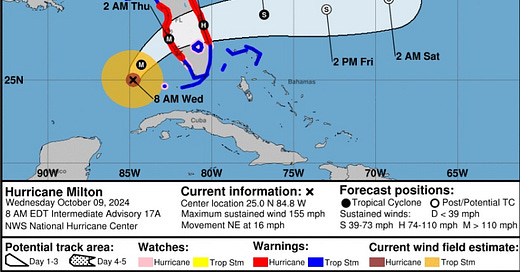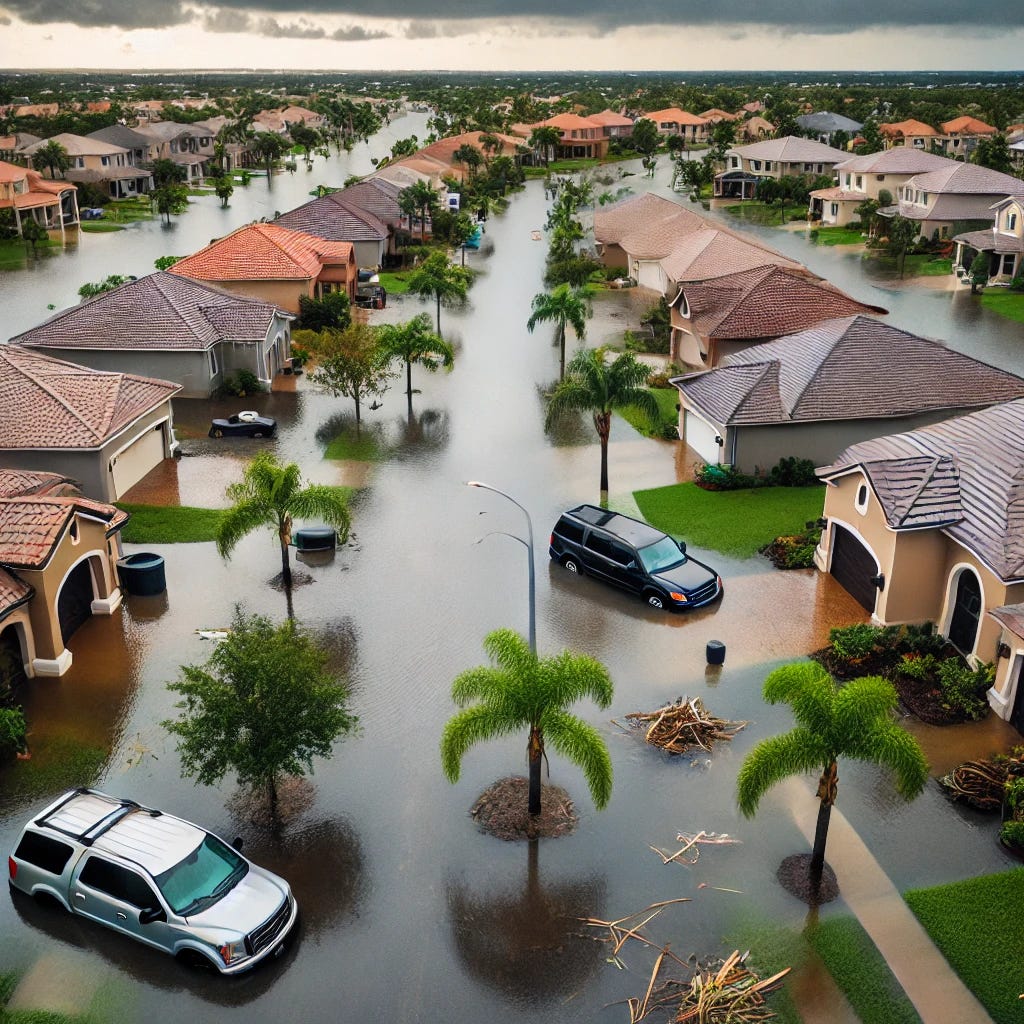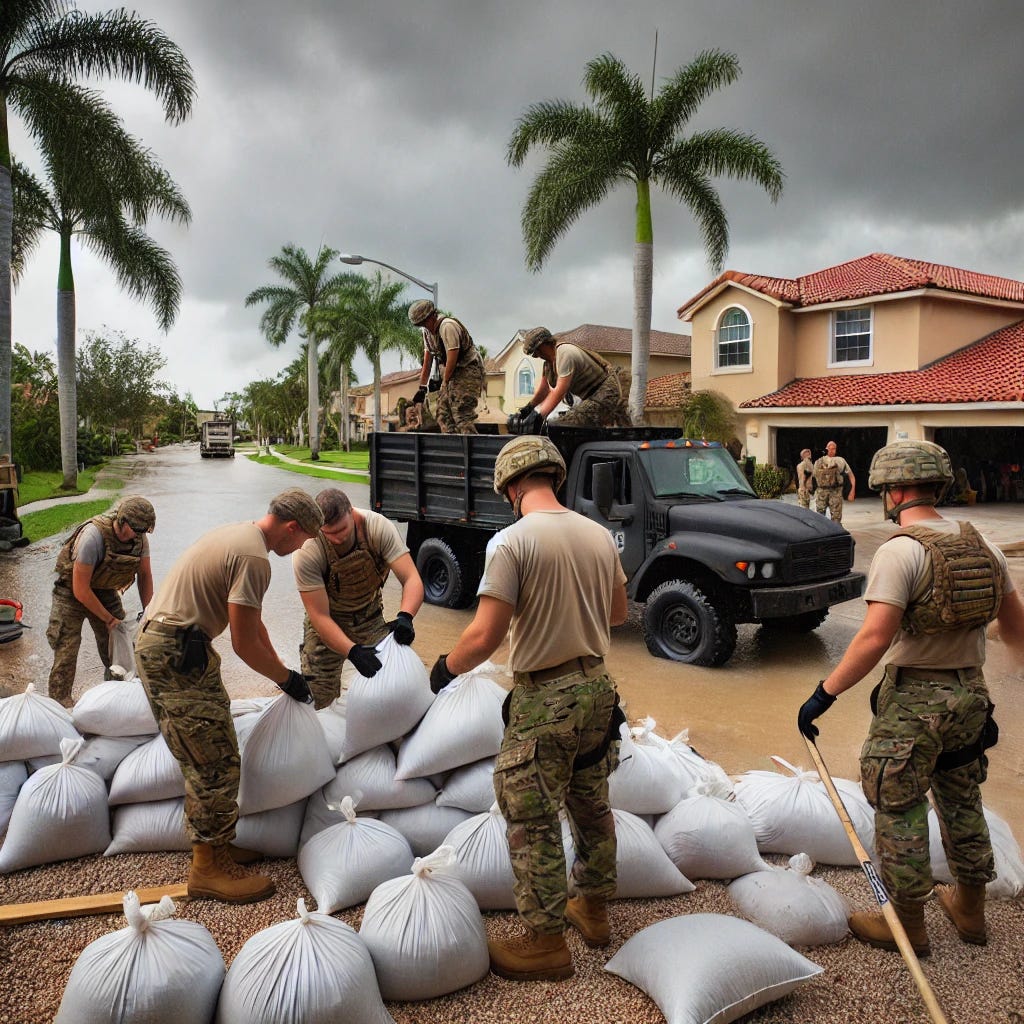“With Milton, we’re looking at a potential high-tide landfall, and that’s a whole different ballgame. We’re talking about an 8-foot high tide, and if the storm adds another 8 feet, that’s catastrophic. Even if the hurricane weakens to a Category 3, the combination of the storm surge and high tide could still be devastating. All the sandbags, plywood, and shutters we’ve put up might not be enough if that water starts coming in.” - Richard Luthmann
By Richard Luthmann
On the latest episode of The Unknown Podcast, co-hosts Michael Volpe and Richard Luthmann discussed the looming threat of Hurricane Milton as it barrels toward Florida's Gulf Coast. Luthmann, a resident of Southwest Florida, is bracing for the storm, while Volpe reflected on his recent experience in North Carolina, where the devastating effects of Hurricane Helene still linger.
Volpe’s Observations of Helene’s Impact on North Carolina
Volpe opened the conversation by recounting his time in North Carolina during Hurricane Helene. He noted that while the storm primarily affected the eastern part of the state, its massive size caused unexpected damage even in the western areas.
“I was in Charlotte and Davidson County,” Volpe said, “and even though it’s farther inland, there was a water main break near where I stayed, which speaks to the storm’s reach.”
Volpe emphasized that many residents in higher elevations were caught off guard.
“People on the mountains don’t expect to get hit. They figure they’re safe up there, and this storm was so enormous that they weren’t prepared.”
Luthmann Prepares for Hurricane Milton in Florida
Shifting focus to Florida, Luthmann shared the latest updates on Hurricane Milton, which, at the time of the recording, was still expected to hit the Gulf Coast. Luthmann lives in the Fort Myers area, a region that’s no stranger to hurricane threats. He mentioned that Hurricane Helene primarily caused tidal flooding in his area but noted a critical factor: it hit during low tide.
“With Milton,” Luthmann explained, “we’re looking at a potential high-tide landfall, and that’s a whole different ballgame.”
According to Luthmann, if Milton coincides with high tide, the storm surge could reach dangerous levels, even if the hurricane weakens.
“We’re talking about an 8-foot high tide, and if the storm adds another 8 feet, that’s catastrophic.”
Luthmann has been busy preparing for the storm, taking steps to protect his home and others in his neighborhood.
“I spent yesterday putting up sandbags, plywood, and hurricane shutters on several houses,” he said.
But his concern isn’t just for his own safety. Luthmann emphasized that tidal flooding could devastate the barrier islands and low-lying areas in and around Charlotte Bay, Fort Myers, and Naples.
The “Dirty Side” of Milton and the Threat of Flash Flooding
A key concern Luthmann raised is that Southwest Florida is expected to be on the “dirty side” of Hurricane Milton—the side of the storm that experiences the strongest winds and heaviest rains.
“If it slows down and hits during high tide, the storm surge on the dirty side will make it much worse,” Luthmann explained.
Adding to the complexity, Luthmann noted that Milton, like Hurricane Ian in 2022, could dump massive amounts of rain across Central Florida, leading to flash flooding long after the storm passes.
“Florida’s infrastructure isn’t built to handle water from every direction like this,” he warned. “Once the rain from Central Florida starts moving toward the coast, it’ll cause even more flooding.”
Looking Back at Ian’s Devastation
Luthmann’s concerns echo the devastation seen during Hurricane Ian, which left behind a trail of destruction when it hit Florida. He highlighted that the combination of storm surge, heavy rainfall, and flash flooding could be Milton’s most dangerous aspect.
"What we're likely to see," he said, "is a storm that not only floods coastal areas but also triggers widespread flash flooding across Central Florida."
As Luthmann described, the danger doesn’t end with the initial landfall.
“The aftermath is just as bad. We’ve seen it before—water lingers for days, and once the infrastructure is overwhelmed, it creates big problems.”
Volpe and Luthmann’s Final Thoughts
As Hurricane Milton inches closer to Florida, Volpe and Luthmann expressed uncertainty about how bad the storm will be. Having seen firsthand Helene's damage, Volpe recognized that preparation is critical.
“You can’t predict everything with these storms, but you can prepare as best as you can,” he said.
Luthmann agreed, adding that he’s hoping for the best but preparing for the worst. “We’re ready here, but if this thing hits at high tide, all the preparation in the world may not be enough to avoid catastrophic flooding.”
Conclusion: Storm Preparations and Caution
With Hurricane Milton’s potential to wreak havoc across Florida, Volpe and Luthmann’s discussion served as a timely reminder to take hurricane preparations seriously. As Luthmann noted, storm surge and flash flooding are the biggest threats.
“Water is the real danger with these storms,” he said. “It’s not always the wind; it’s the flooding afterward.”
For Floridians in Milton’s path, time is running out. As Luthmann said in closing, “You have to be ready, especially with this storm potentially slowing down. That gives it more time to dump rain and push that surge inland.”
The discussion between Michael Volpe and Richard Luthmann highlights the severity of the situation and the importance of preparation as Hurricane Milton inches closer to the coast. Stay tuned to The Unknown Podcast for more updates on Milton and other stories.
Next Steps: How You Can Prepare for Hurricane Milton
Evacuate early if you’re in a flood-prone or evacuation zone.
Stock up on essentials like food, water, and medical supplies.
Prepare your home by securing windows, doors, and placing sandbags where needed.
Stay informed by monitoring local news and weather updates.
LEE COUNTY FLORIDA HURRICANE GUIDE
For more information and insights, follow Michael Volpe at michaelvolpe.substack.com and Richard Luthmann at luthmann.substack.com.



















Share this post